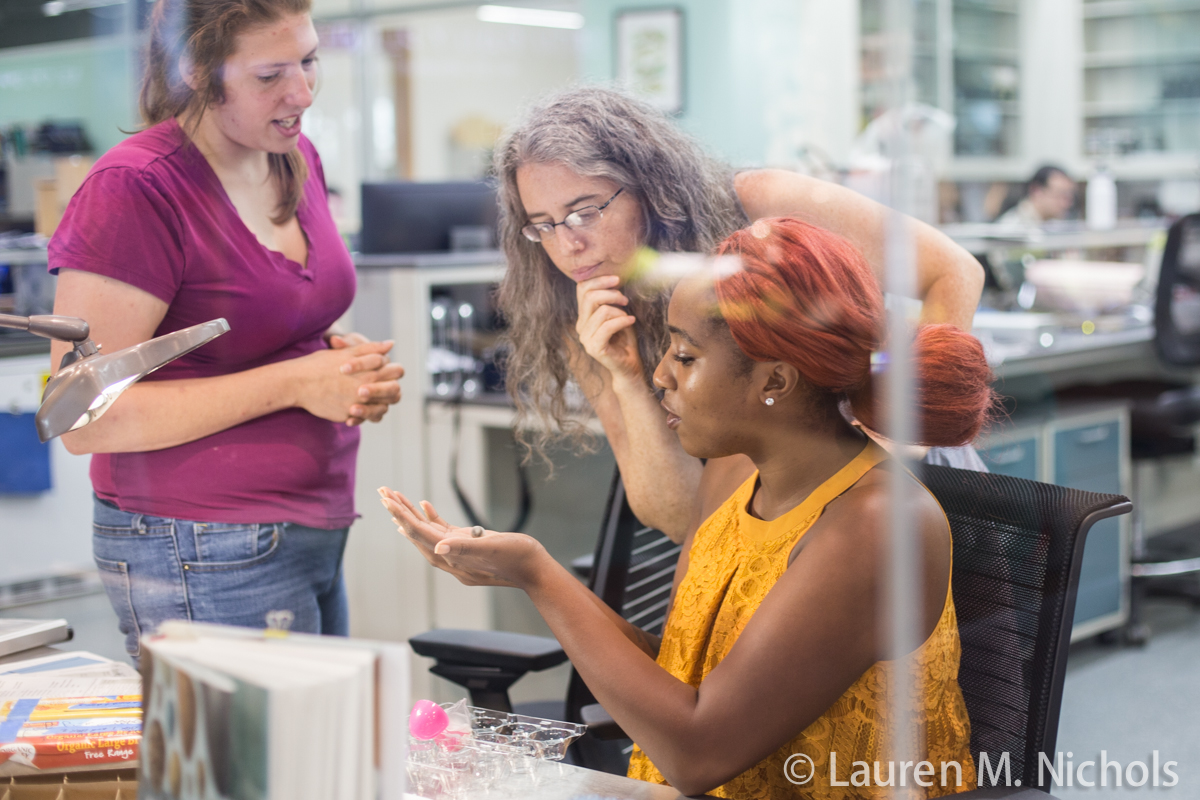Research

Research Interests
I enjoy the interdisciplinary approaches of ecological and social science research together, with a lens of justice, equity, diversity, and inclusion (JEDI). Current projects and topics of interest to me include:
Design in the Participatory Sciences
Within the participatory sciences, my research focuses on challenges in the design of large-scale contributory projects, often called citizen science. Contributory projects can be designed to produce new knowledge and simultaneously create a range of socially relevant outcomes, such as increases in science literacy, community empowerment, heightened civic activism, and more. With funds from NSF, we collaborate with SciStarter.org to investigate and support a growing community of participants and project leaders. Students investigate participant demographics, motivations, and learning. We are investigating the barriers to have resulted in a lack of racial, economic, and educational diversity among participants and beneficiaries of citizen science.
With new funds from Unity and the National Science Foundation, I lead the Inclusive, Diverse, Equitable, Accessible, Large-scale (IDEAL) Participatory Science Initiative. The IDEAL Participatory Science Initiative is in response to recognizing striking demographic limitations of large-scale citizen science projects: participants in the Global North tend to be white, highly educated, and affluent. We created a Handbook and Tutorial (to be released in January 2024).
Selected work
Inclusion in citizen science: The conundrum of rebranding (2021) – Science (as highlighted above)
Advice for Collaborations between Natural and Social Scientists: A Response to Martin (2020) – BioScience
The Field Guide to Citizen Science: How You Can Contribute to Scientific Research and Make a Difference (2020) – Timber Press
Do birdwatchers buy the duck stamp? (2019)
The problem with delineating narrow criteria for citizen science (2019) – PNAS
The role of citizen science in addressing grand challenges in food and agriculture research (2018)
Scistarter 2.0: A digital platform to foster and study sustained engagement in citizen science (2017)
Citizen science terminology matters: Exploring key terms (2017)
Citizen science: How ordinary people are changing the face of discovery (2016)
The theory and practice of citizen science: Launching a new journal (2016)
Two meanings of citizen science (2016)
Ecology of Lightscapes and Soundscapes
Artificial light at night and anthropogenic sounds are features of the landscape that novel selection pressures and drivers of ecological processes. In collaboration with the National Parks Service’s Dark Skies and Natural Sounds division, we developed Sound Around Town, a citizen science project focused on understanding residential soundscapes and human perceptions of noise. Current students investigate links between noise and light pollution and avian survival and how breeding songbirds overcome the physiological stresses of night lighting. We are also studying the role of historic and contemporary racial segregation of inequities in exposures to light and noise pollution.
Selected work
How can citizen science advance environmental justice? Exploring the noise paradox through sense of place (2020) – Cities & Health
Sensory pollutants alter bird phenology and fitness across a continent (2020) – Nature
Acoustic environments matter: Synergistic benefits to humans and ecological communities (2017)
A framework to assess evolutionary responses to anthropogenic light and sound (2015)
Norms of Data Ethics in Citizen Science
Volunteer-generated data are the foundation of citizen science practice. With funds from the National Science Foundation, and in collaboration with the Citizen Science Association, we are co-creating tools and resources to create and sustain norms of trustworthy data practices for the field of citizen science. We are also studying the attitudes, norms, barriers, and intentions of practitioners towards data stewardship practices.
Selected work
The power (dynamics) of open data in citizen science (2021)
The critical importance of citizen science data (2021)
Avian Incubation Behavior and Physiology
I worked for almost 15 years at the Cornell Lab of Ornithology where I focused latitudinal and seasonal trends in avian life histories and behavior. One particular interest has been avian incubation, which is one of the energetically demanding phases of reproduction. I continue this work with international collaborators.
Selected work
Deconstructing incubation behaviour in response to ambient temperature over different timescales (2021)– Journal of Avian Biology
‘Green incubation’: avian offspring benefit from aromatic nest herbs through improved parental incubation behaviour (2018) – Proceedings of the Royal Society B
Managing human-wildlife conflict
The Sparrow Swap is a citizen science project designed to help bird watchers minimize damage of invasive house sparrow on native cavity-nest species. Sparrow Swap also provides a small, tractable study system in which to investigate a highly contentious (among birdwatchers) area of human-wildlife conflict. We are using ecological, social science, and citizen science approaches to carry out research to understand the potential of citizen science design to manage sparrows within a social-ecological system. Lessons learned will be relevant to other human-wildlife conflict such as with feral hogs, suburban deer, coyotes and wolves, pet cats, urban geese, and more.
Selected work
Avian eggs as bioindicators of contaminants
The Sparrow Swap project involved volunteers across the country in donating house sparrow eggs to the Collections at the North Carolina Museum of Natural Sciences. These eggs are a remarkable resource for investigations into the evolution of egg characteristics as well as their use as bioindicators. We are assessing whether certain eggshell characteristics (color, patterning, thickness, porosity, etc) are related to certain contaminant levels within the egg.